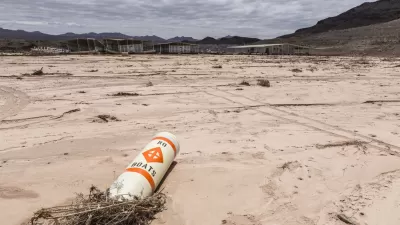A new book created by the Sonoran Institute explains how exploratory scenario planning can be useful to prepare for the uncertainty of water in the near- and long-term future.

John Shepard, senior director of programs at the Sonoran Institute, writes a blog post that offers news of a new book to aid in scenario planning for water supply issues in the western United States.
Shepard offers some historical context for why scenario planning can be powerful tool for water infrastructure planners:
Historically, communities planned around water supply and demand with specific goals in mind—we expect to grow by X, so we will need Y amount of water to meet future needs. They had a confidence that there would be few surprises ahead, but in reality, communities need to consider a range of possible situations when they plan for their water supply. Communities need to be able to pivot accordingly, depending on which future comes to pass.
The book offers case studies of scenario planning applied in three planning efforts—the Colorado Water and Growth Dialogue, a systems improvement process in Fort Collins, and an effort at the Upper Gila Watershed Partnership to identify resilience strategies for the watershed.
The Sonoran Institute wrote the book, published in August 2020, which was published by the Lincoln Institute of Land Policy. Video tutorials and other resources are also available to complement the guidance found in the book.
FULL STORY: Planning for an Uncertain Future around Water

Planetizen Federal Action Tracker
A weekly monitor of how Trump’s orders and actions are impacting planners and planning in America.

Restaurant Patios Were a Pandemic Win — Why Were They so Hard to Keep?
Social distancing requirements and changes in travel patterns prompted cities to pilot new uses for street and sidewalk space. Then it got complicated.

Map: Where Senate Republicans Want to Sell Your Public Lands
For public land advocates, the Senate Republicans’ proposal to sell millions of acres of public land in the West is “the biggest fight of their careers.”

Orange County, Florida Adopts Largest US “Sprawl Repair” Code
The ‘Orange Code’ seeks to rectify decades of sprawl-inducing, car-oriented development.

Maui's Vacation Rental Debate Turns Ugly
Verbal attacks, misinformation campaigns and fistfights plague a high-stakes debate to convert thousands of vacation rentals into long-term housing.

San Francisco Suspends Traffic Calming Amidst Record Deaths
Citing “a challenging fiscal landscape,” the city will cease the program on the heels of 42 traffic deaths, including 24 pedestrians.
Urban Design for Planners 1: Software Tools
This six-course series explores essential urban design concepts using open source software and equips planners with the tools they need to participate fully in the urban design process.
Planning for Universal Design
Learn the tools for implementing Universal Design in planning regulations.
Heyer Gruel & Associates PA
JM Goldson LLC
Custer County Colorado
City of Camden Redevelopment Agency
City of Astoria
Transportation Research & Education Center (TREC) at Portland State University
Camden Redevelopment Agency
City of Claremont
Municipality of Princeton (NJ)





























